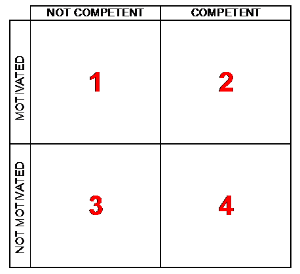Time management - Poor delegation and the team
Poor delegation and the team
General
You could argue that delegation is just a way of manipulating people to get them to do what you want.
This is definitely not true. Manipulation is trying to get people to do things that they are not aware of and don’t agree to for your own advantage.
Delegation give individuals an opportunity for self improvement and they are told exactly what it involves and what is expected of them.
In an ideal world your team will be experienced and posses the necessary skills and enthusiasm to take on your delegated tasks with ease.
However, not every person possesses all of these requirements and it will be up to you to ascertain the nature of your personnel.
When someone tackles a job they will approach it with a mixture of two key factors ‘competence’ and ‘motivation’.
A lack of either can make delegation difficult. Individuals can, in broad terms, be put into one of four boxes as above.
These tend to be newcomers full of enthusiasm. They could be newly promoted to a post and hence lack the necessary skills and experience.
Alternatively, an individual could be well motivated but has now come to the limit of their abilities and may need extra training to maintain the motivation.
Here well defined instructions telling the individual what to do will pay dividends. They will graduate to Box 2 as their experience builds up and you feel you can trust them to be more independent.
Praise is an important part of all delegation.
Many managers rarely give praise.
Particularly for a new recruit, you could ask them for a detailed activity report to keep an eye on progress. By keeping a close watch on someone it is easier to step in when they have done something right to give deserved praise.
It is good to give praise and not only as a positive reward for good work.
You should also give praise when telling someone they have got it wrong.
How does that work?
Well, if things go wrong you need to do something about it. This is part of the training of your staff (or perhaps children).
As soon as you know about an error go to the person and tell them that they have done it wrong.
Don’t wrap up what you want to say in a 30 minute conversation. Get to the point.
When carrying out a reprimand it is important that you tell the person that it is nothing to do with their personality or competence it is just a plain fact that they did the wrong thing.
Make sure any reprimand is based on facts.
This is where the praise comes in.
You have been concerned only about the current error not their ability to perform the job, their skills or them as a person. Otherwise you would never have given them the job in the first place. Tell them that you value them for this reason but the last task could have been handled in a different way.
The actual reprimand should be very short but you may wish to discuss what they think went wrong.
What should they have done?
Can it be corrected, if so, how?
Do they have any ideas? If not ask them to think about it and get back to you to discuss it?
The latter is OK provided an urgent solution is not required and you know what it is.
Whether you give praise or a reprimand be consistent. It doesn’t matter whether you are having a good day or not.
If you train people well by delegation and improving motivation you probably will have a reasonable staff turnover as those persons will be promoted as potentially good managers in their own right.
When anyone does a task one of the most important aspects is the feedback either as an end of job review or intermittent praise.
Box 2 (competent and motivated)These people have the necessary skills and experience.
People here can take on delegated tasks easily. They will require less attention and progress monitoring.
Praise as usual.
These people are de-motivated for a number of reasons. They lack the necessary skills and hence training making jobs harder than they need be.
Previous work experiences with other managers may have been a negative one. Some people seem to reach the limit of their abilities. They may be in the wrong position or attempting to do work outside of their job description.
Persons here will need close monitoring as you coach them to learn more about the job. Check any plans before they start and encourage them to solve their own problems in order to gain more experience. Praise for all successes.
Box 4 (competent and not motivated)These people are experienced; often being in a position for a long time. They probably feel bored in the position and may have been overlooked for promotion. As for Box 3 poor influence of previous management can be detrimental. In general the person may feel unable to do the job for a variety of reasons generating insecurity.
A lack of motivation means the individual needs to feel involved and encouraged with tasks. Get them involved in decision making and perhaps allow them to be indirectly involved as an assistant in a major project. Praise them and bolster their confidence by making sure that all credit goes their way and not yours.
In each of the boxes you will be making all of the major decisions except for Box 2 where true delegation exists and the individual makes the decisions.
In the case of the ‘not motivated’ group you will provide most of the information when they are ‘not competent’ but for those who are ‘competent’ this will be a lot less.
If you want a skilled team you only have two options. Pay the going rate and recruit personnel with the skills or train people.


